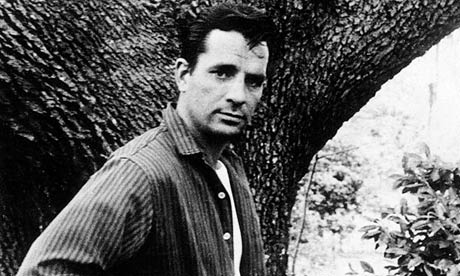
When the leaves turn to gold and brown and the pale mist makes islands of the hilltops, and the dark nights start to creep in ever earlier, I always think of Jack Kerouac.
Kerouac is, for me, a highly autumnal writer, and I feel the weight of his words most keenly in October. It was a month beloved of Kerouac himself, who wrote at the close of the first act of On the Road, "I was going home in October. Everybody goes home in October."
Home, for Jean-Louis Kerouac, was Lowell, a small mill-town in Massachusetts where he was born and where his gravestone has sat, with the message "He honored life", since his death in … October, of course, 21 October 1969.
This October seems particularly Kerouackian. Last week saw the release of the long-awaited movie version of his Beat classic On the Road, the unfilmable book filmed by Walter Salles. On The Road was famously written in a speed-fuelled haze on a long roll of paper so Kerouac wouldn't have to interrupt his crazy, spontaneous, be-bop prose-poetry by having to put a new sheet into his typewriter: the original scroll is on display at the British Library until the end of the year.
Jack's hometown celebrates the writer every October, with this year's festivities including a literary festival, the world premiere performance of a Kerouac play, The Beat Generation, and even a 5k road race in his honour.
And it's Lowell which surely must have made Kerouac so Octoberish. At the heart of New England, famous for its displays of autumn leaves, it certainly inspired one of his most intriguing works, Doctor Sax, a collision of childhood memories entwined with the imaginary adventures of the titular pulp anti-hero spook of Jack's childhood imaginings.
"In the Fall there were great sere brown sidefields sloping down to the Merrimac all rich with broken pines and browns," he writes in Doctor Sax, which is redolent with childhood adventures through the autumn dusk, loitering on the "wrinkly tar corner" of his beloved Moody Street.
In Book of Dreams, the 1960 collection of his mind's nocturnal wanderings, the only dated entry – October 14 1953 – harks back to the Lowell of Doctor Sax, "where figures stalk cleanly and sharp in soft gloom clouds…"
For all his travelling, Kerouac never let Lowell leave his heart. As a young man in New York in 1941 he swapped letters with his childhood friend (and later brother-in-law) Sebastian Sampas, many of which are printed as back-matter in the "lost" Kerouac novel The Sea Is My Brother, published by Penguin earlier this year. The letters include excerpts from a play the young Jack began to write called Oktober, featuring a personification of the autumn season and a recurring line "the end of something old, old, old" which reappeared in his poem "I Tell You It Is October", in the collection Atop an Underwood. Editor Dawn M Ward observed: "To both young men the month of October was in many ways magical, transcendent to the everyday."
Kerouac never really returned to Lowell, until his funeral on October 24 1969. There's a tale – apocryphal, I think – that two old Lowellians watched the procession up to Edson cemetery and one asked the other who had died. "Jack Kerouac," said one. The other shrugged. "Who's Jack Kerouac?"
Kerouac, of course, was past caring. He was dead and buried, and it was, (to quote the title of one of his beautiful prose-poems) October in the Railroad Earth, when "high in the sky the magic stars ride above the following hotshot freight trains".

